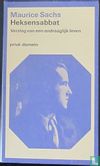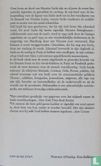



Catalogue information
Text back cover: The most fantastic legends and rumors about the life and death of Maurice Sachs have been circulating for years now. In our country, interest in the figure of Sachs increased sharply after the release of Violette Leduc's Bastard, in which Sachs appears as the focus and driving force of a number of scandals. He himself once wrote that his whole life was one big scandal. The Jew Sachs - his real name was Maurice Ettinghausen - first collaborated with the Nazis, was still imprisoned by the Gestapo in 1943 and murdered by a Flemish SS man after a terrible death march in the Hamburg area on April 14, 1945. His body has never been found. Rumors that he would still be alive continue to circulate today. Nearly 1,500 unpublished manuscripts were found in his estate! Novels, stories, plays, essays, diary, letters and above all are many, many memories. In this book one finds the most comprehensive and picaresque chronicle of literary life and the vie-de-bohème in Paris and France during the two decades before the Second World War. Sachs knew everyone: the writers Maritain, Cocteau, Gide, Proust, politicians - he also wrote a book about Thorez -, painters, photographers, journalists, publishers, all the VIPs of his time, infamous - and celebrities from the underworld and from the world of prostitution. The Witch's Sabbath is a sequence of strange adventures and experiences. The New York Tinies Review of Books recently called it "an indispensable goldmine of data, covering the period 1920-1940." In 1942, Sachs' French publisher received the last letter from Sachs: "This is a poor book that tells of an equally miserable hero," he writes about Le Sabbat. The second edition has a different front cover than the first edition
This text has been translated automatically from Dutch
Click here for the original text



